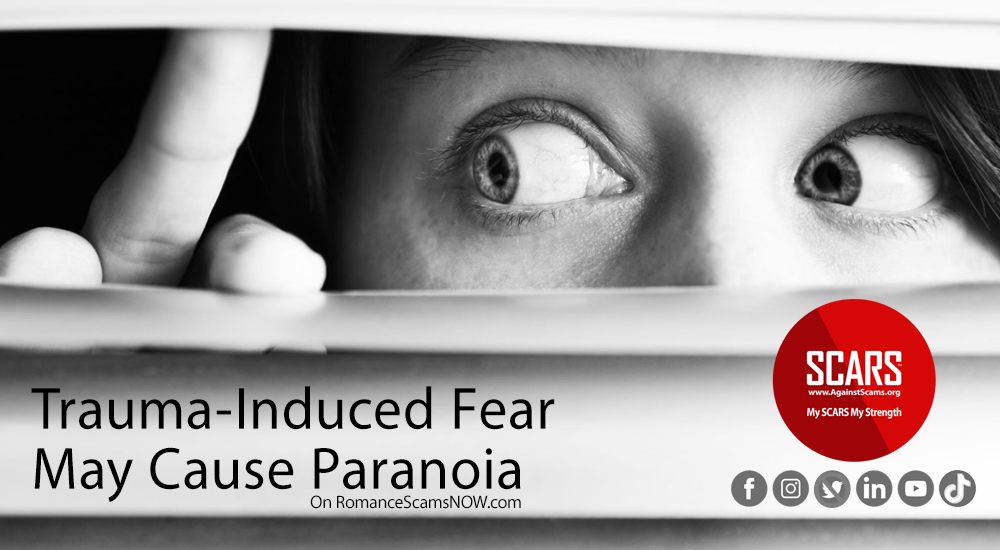Trauma-Induced Fear May Cause Paranoia
Psychology of Scams
A SCARS Insight
How Trauma Can Cause Paranoia
Post-traumatic stress disorder (PTSD), and even milder forms of trauma has a variety of symptoms that present differently in each individual who has experienced a traumatic and life-altering event, such as a romance scam or other type of relationship fraud.
Traumatic experiences lead to psychological trauma which can leave one feeling helpless and struggling with upsetting emotions that seem to never go away.
This is the result of an unexpected or repeated overwhelming event such as the emotional abuse and manipulation that comes from a trust relationship gone wrong.
PTSD is often associated with war veterans but they are not the only ones who experience it. Survivors of relationship scams also can exhibit symptoms of PTSD.
Trauma itself is a lot more common than most people realize and the after-effects of trauma can be unbearable or dangerous for some. This is why it’s important to seek out professional trauma counselors or therapists for help. A licensed therapist or counselor can help evaluate a scam victim and develop healthy coping strategies, which might or might not include a victims’ support group.
Without that support, trauma can make a victim increasingly more paranoid resulting in emotionally harming themselves or others while coping with the symptoms. Both trauma and paranoia are treatable mental health conditions.
CAN TRAUMA CAUSE PARANOIA?
Studies have shown that while trauma does increase the likelihood of paranoia, it does not cause paranoia. This means that someone who has experienced trauma in their lifetime has a greater chance of experiencing paranoia in the form of hypervigilance of the mind and body.
But trauma can regularly be triggered that results in a fear response, and this can manifest as paranoia as well!
Paranoia symptoms show up differently in everyone and usually are not as severe, as in a classical diagnosis for paranoia. But, it can be more mentally self-destructive, for instance, when scam victims’ thoughts and perceptions about themselves can be very negative. This paranoia fear response also decreases their ability to accept and receive help.
Research indicates a strong association specifically between trauma and psychosis when it comes to hallucinations. This paranoia can cause extreme anxiety and distress because those hallucinations can be trauma-related triggers. Similar to PTSD flashbacks. It’s important to note that most people who access counseling have not experienced symptoms that are this severe, but again each person is different. If a person is experiencing psychosis, delusions or hallucinations, the best practice would be to contact a psychiatrist immediately.
Trauma can lead some to become more avoidant, distant, or hypervigilant of people and their surroundings. This can turn into distrust of those that are or have been helping or supporting them.
WHAT IS HYPERVIGILANCE?
Individuals who are hypervigilant are constantly anticipating the occurrence of something. Some are more likely to be aware of their surroundings because their trauma led them to question their safety at all times. Others will tend to go into shut down mode, and this can trigger greater anxiety as events and situations surprise them constantly. Anything out of the limited ordinary can trigger a fear or paranoia response.
Hypervigilance isn’t abnormal because it is our body’s way of protecting us from harm. It’s important for people to be aware of their surroundings so that the appropriate survival response can come online should there be a genuine danger. However, for some, the default response to stimulus becomes the flight mode – meaning fear.
While people experiencing trauma have a valid reason to be on alert. It isn’t necessary to be on guard at all times when there is no known or real threat in the present moment. Their level of hypervigilance can disrupt them from recovering from their trauma or leading a better life for themselves.
Examples of trauma-induced hypervigilance include:
- Avoiding spaces where there is too much of a threat – too much activity
- Being easily scared or jumpy at any sudden noise or movement
- Being distrustful of any new situation even from people otherwise trusted
- Believing there is an incoming or imminent threat around the corner
- Arming oneself with weapons to protect them from perceived threats – can be dangerous especially if someone is jumpy and uses a weapon on someone without properly assessing what they believe is a threat
- More secrecy than is called for, and paranoia about discovery
- Loss of sleep and sleep deprivation
- Fatigue, being constantly tired
- Trouble focusing on learning or the logic of things that may affect them – including understanding relatively simple concepts
FINAL THOUGHTS
If YOU begin to avoid public spaces, avoid people, or take extra precautions to ensure your safety, engage in increased secrecy, or more frequent fear responses to normal situations, then your trauma may be increasing.
It’s important for you to seek professional help. This is not the role of a support group and is not a service that SCARS provides. Here is a directory of professional trauma counselors and therapists: https://www.psychologytoday.com/us/therapists/trauma-and-ptsd
You deserve to live a life that is yours without having to be on guard at all times.




Leave A Comment